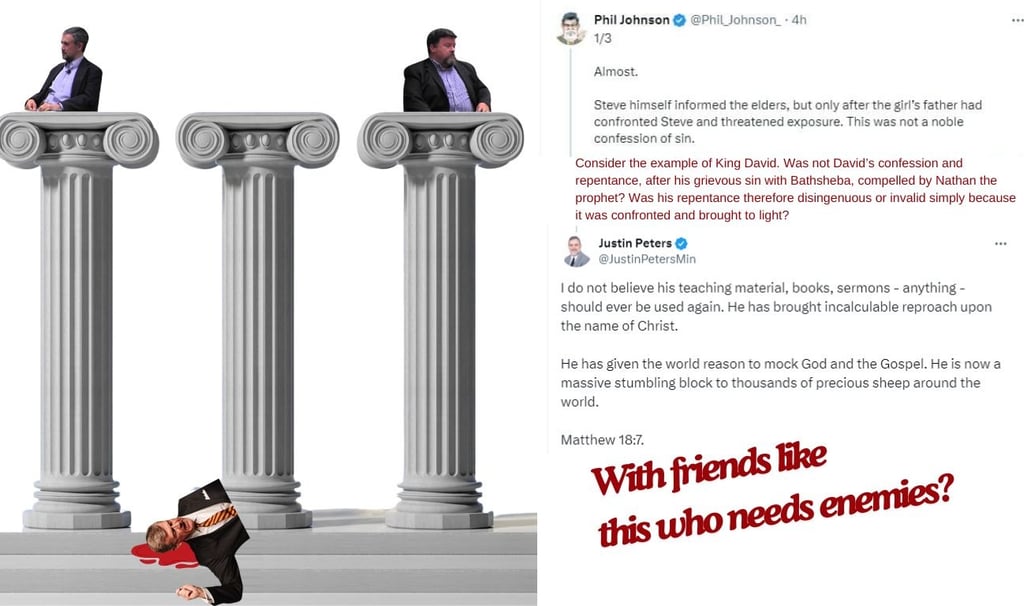Grace Over Judgment: Responding Biblically to a Fallen Brother in Christ
This blog post challenges the graceless responses to a fallen leader, emphasizing the biblical call to approach sin with grace, repentance, and the hope of restoration within the body of Christ.
CURRENT EVENTSTHEOLOGICAL ARTICLES
Justin Hoke
9/26/20244 min read


As more news emerges regarding Pastor Lawson, my heart grows heavier—not just because of the sin itself, but because of the public response from some of his closest colleagues, men who have labored alongside him for years in ministry. It’s deeply concerning to witness such a graceless and self-righteous reaction from those who claim to be his friends, as they distance themselves in his time of greatest need. This is when grace and support are most crucial.
It seems as though some in the ministry act as if they are immune to the very sin that "so easily entangles" us all (Hebrews 12:1). Their attitude implies that the warning in Hebrews should be rewritten: "The sin that so easily besets YOU"—as though ministers of the gospel are somehow above being entangled by sin. Yet the truth is, ministers, like all of us, remain fallible men, sinners in desperate need of grace.
While the situation is serious, and we should never minimize sin, the Bible calls us to respond in a way that mirrors the heart of Christ—a heart that both confronts sin and offers restoration. When a minister falls, Scripture doesn’t offer a different set of instructions for dealing with them. It doesn’t say, "Brethren, even if anyone is caught in any trespass (except a minister), you who are spiritual should restore such a one in a spirit of gentleness" (Galatians 6:1). Nor does it say, "Bear one another’s burdens (except for fallen ministers)" (Galatians 6:2). The same grace extended to the layperson should be extended to the pastor. If anything, the weightier responsibility of ministry calls us to greater compassion, not less.
I’ve been particularly troubled by some comments from those within the Lordship salvation camp, suggesting that repentance which is "compelled" is somehow invalid. This argument raises the question: Have we forgotten the Scriptures we so diligently proclaim? Consider the example of King David. When confronted by the prophet Nathan, David’s repentance was undeniably compelled by the convicting power of God’s Word. Yet it was sincere, and it led to his restoration (Psalm 51). If David’s repentance wasn’t disingenuous, why should we assume that a minister’s repentance is invalid simply because it was prompted by confrontation?
Scripture’s instruction is clear: "Brothers, if anyone is caught in any transgression, you who are spiritual should restore him in a spirit of gentleness" (Galatians 6:1). The goal is always the same—repentance and restoration, not condemnation and abandonment. To see public statements that seek to permanently disqualify someone, even before the process of repentance has truly begun, is not only premature but harmful. Restoration is a serious and weighty process, requiring humility, true repentance, and submission to godly accountability. But to declare someone irredeemable or beyond restoration is contrary to the heart of the gospel.
What strange legalism has crept into parts of the Reformed community, where instead of offering grace, we see wounds inflicted at a time when healing and intercession are needed most? Jesus didn’t distance Himself from the sinner—He touched the leper, healed the broken, and extended grace to the outcast. The apostle Paul reminds us that even in cases of unrepentance, the goal of church discipline is still restoration, not rejection (1 Corinthians 5:5).
I can’t help but feel sorrow when I see a man who has labored faithfully for Christ being treated with such harshness by those closest to him. It seems as if some have elevated the ministry to such an extent that they now fear becoming "unclean" by associating with someone who has fallen. But ministry is not an idol, and the integrity of the gospel does not hinge on the sinlessness of its ministers. We all remain sinners in need of grace, and none of us are above the very temptations that brought down this brother. James 3:1 warns that teachers will be judged with greater strictness, yet it does not remove their need for grace, nor does it place them outside the possibility of restoration.
So how should we respond when a brother in ministry falls? The proper response should be one of sorrow and prayer. We should say, "This is a grievous situation, and it brings reproach upon the name of Christ and His bride. But we rejoice that our brother has confessed his sin, and we will come alongside him and his family, ministering to them in their time of need. We will weep with them, pray with them, and seek the Lord’s guidance for their restoration." This is how the body of Christ should respond—not with fear and distance, but with grace and humility, remembering that "let anyone who thinks that he stands take heed lest he fall" (1 Corinthians 10:12).
The world is watching, and Jesus said that they would know we are His disciples by our love for one another (John 13:35). But what I see right now doesn’t look like love. It looks like fear. It looks like self-preservation. And it looks like legalism, not the gospel of grace.
We must not forget that the same grace that saved us is the grace that sustains us. It is the grace that restores even the most broken sinner. Let us not be quick to condemn or slow to restore. Instead, let us be agents of both truth and grace, standing firm in the call for repentance, but also leading the fallen toward the cross, where grace flows freely, and where restoration is always possible.
